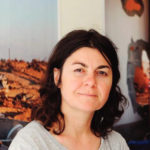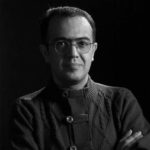(“Café 469”, 2006, Iran, Atefeh Khademolreza)
How did you learn about FCI film festival?
One of my filmmaker friends introduced me to it.
You currently live in Canada. As a filmmaker are you still active in Iran as well? Is it even possible for you to work in both countries or are there limitations?
Yes, I am still active in Iran. As an international filmmaker, I haven’t had issues working in different countries so far.
Your short film “Café 469” aroused a strong reaction among FCI American audience, perhaps because it touches on such sensitive issues as suicidal attacks or mass murder. Is your film related only to these topics or are there other layers you would like your audience to grasp? And does number 469 have a special meaning for you?
It was in 2006 that the first spark of the idea came to me as I read a poem called ‘The Terrorist, He’s Watching’ by Polish poet and essayist, Szymborska, 1990. I wrote my script and I decided to make it in Café 469. Café 469 was a hangout place in ValiAsr Street in Tehran, that my friends and I used to frequent. So, I put its name as my film title.
As a middle eastern resident, you get used to hearing daily news about violent attacks and you never know if you would be the next victim. In Cafe 469, I intended to explore that life is short, enjoy every moment from the view point of a terrorist.
In Café 469, a special attention is paid to the younger generation in Iran. If so, what do you see as some of the outstanding features of this generation? Do you think Iranian youth is more informed about their socio-political complications in relation to that of the generations before? Will they be able to resolve this?
One of the outstanding features of the location of a Cafe is that it is where young people often gather. That’s why you see more young people in my film. In addition, I believe that Iranian youth have a higher level of awareness of current social issues than before. The future belongs to the young. So, obviously they will strive for achieving a better one.
You have directed and produced both short and feature films. Which genre fascinates you the most, and why?
My works are concerned with the experience of disorientation both culturally and socially. I express myself within poetic and experimental filmmaking. In terms of length, it really depends on what kind of story I intend to explore. Actually, if short films had as many viewers as feature films, I prefer to make short films.
To what extent do you believe in a finished script prior to your production? Is it the same with both, short and feature films? Or are short films’ script made on location?
Whenever I feel like I can watch my script happen on screen, I know that the script is ready to shoot. It doesn’t matter whether it is a short or a feature. I like to have a complete script before shooting. Of course, when I want to make a poetic experimental film, I usually follow the concept or the main idea in the environment and I may not have a script with details.
You could have selected a different art form to communicate your ideas such as poetry, painting or still photography. what is it about film that has captured your imagination?
I believe that filmmaking gives vivacity and spirit to an artist’s idea. You make a new world come to life, however it is virtual at the same time. This concept is very magical and fascinating to me.
The viewer has a certain experience watching the film, and then there is also the impact the film leaves on its audience after it has been seen. What do you imagine that people will want to talk about after they see your film?
I would like to hear about my viewers’ sensory and visual experiences after they watching my movies. Sometime their experience is close to my emotional intent, and sometime it is different. Either way I am interested in hearing their viewpoints.
Is there anything else you want us to know about you as a director or about your film?
Thank you very much for letting me talk about my film. Keep in touch.
What is next for you as a filmmaker?
I am working on a new feature fiction script, currently researching a different and new idea.
Thank you very much. It was a great pleasure talking with you.
“December 2019”
Disclaimer: Please note that most artists, filmmakers and authors presented by FCI are not native speakers of the English language. To avoid misinterpretation, it is FCI’s policy to print their responses as received without structural or content changes.

